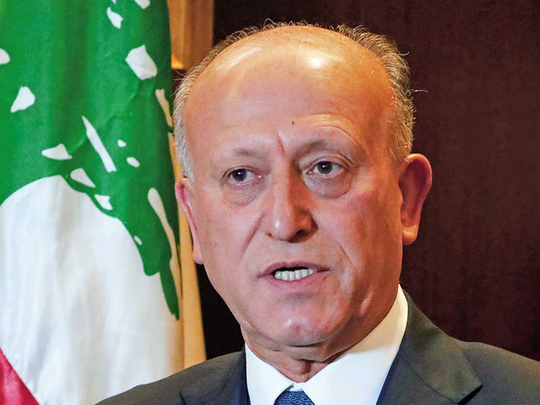
BEIRUT — Lebanon could face economic sanctions from Arab countries or worse if Hezbollah does not stop meddling in regional conflicts, a Lebanese Sunni politician said on Friday.
Former Justice Minister Ashraf Rifi, who rose to prominence with vocal opposition to Hezbollah, is closely aligned to the Saudi position in Lebanon.
“We can expect economic repercussions. At the political level too, at the level of our Lebanese-Arab relations. And it’s open to all the possibilities, unfortunately,” he said.
His comments to Reuters echo recent statements by Sa’ad Hariri, who quit abruptly as Lebanese prime minister in a broadcast from Saudi Arabia two weeks ago.
Rifi said he has been in touch with Saudi officials recently over Lebanon’s crisis and is familiar with Riyadh’s thinking.
Rifi defeated a Hariri-backed list in local elections in the mostly Sunni city of Tripoli last year, though he lacks the premier’s countrywide standing.
“Today, Lebanese officials have a big responsibility. All the Lebanese officials have to be careful about good relations with the Arab world,” Rifi told Reuters. “There is no more leniency towards Hezbollah ... using its illegitimate arsenal” in Middle East conflicts.
Lebanon’s heavily armed Hezbollah, a part of the political fabric, wields great influence in the country. It also has sent thousands of fighters into Syria to battle alongside the Damascus government against mostly Sunni rebels.
“Lebanon cannot live without the Arab countries,” Rifi said.
“We know how many Lebanese work in Saudi Arabia or in the Gulf and how much revenue they bring ... to the Lebanese economy.” Up to 400,000 Lebanese work in the Gulf, and remittances flowing into the country are a vital source of cash to keep its economy afloat and the heavily-indebted government functioning.
Saudi Arabia and its Arab allies have now drawn a line in the sand, Rifi said. “That there is no place for (Hezbollah) in (Lebanon’s) future government, if it keeps choosing to be a security and military arm for Iran.” The Lebanese state will have to distance itself in “a real and practical” way from regional wars “so that we don’t bear the repercussions of Hezbollah’s acts,” he added.
In his resignation speech, Hariri said he feared assassination, railing against Iran and Hezbollah. In his public comments after quitting, Hariri warned of possible Arab sanctions and a danger to the livelihoods of Lebanese in the Gulf. Hezbollah must stop intervening in regional conflicts, particularly Yemen, he said.
Lebanon’s President Michel Aoun has called Hariri a Saudi ‘hostage’. Hariri became prime minister last year in a power-sharing deal that made Aoun, a Hezbollah political ally, president and his coalition government includes Hezbollah.
Rifi criticised Aoun’s stance, as well as other Lebanese accusations that Riyadh forced Hariri to quit, as “surprising and unprecedented”. He considered Hariri’s resignation constitutional and said Lebanon would have to form a new, “more balanced” government in the near future.
Rifi, a former police chief, resigned as justice minister in 2016 in protest at what he described as Hezbollah’s dominant role. He had also heaped criticism on Hariri for nominating another Hezbollah ally to fill the vacant presidency.
“From the moment the prime minister uttered his desire to quit, the government became a resigned one,” he said.












